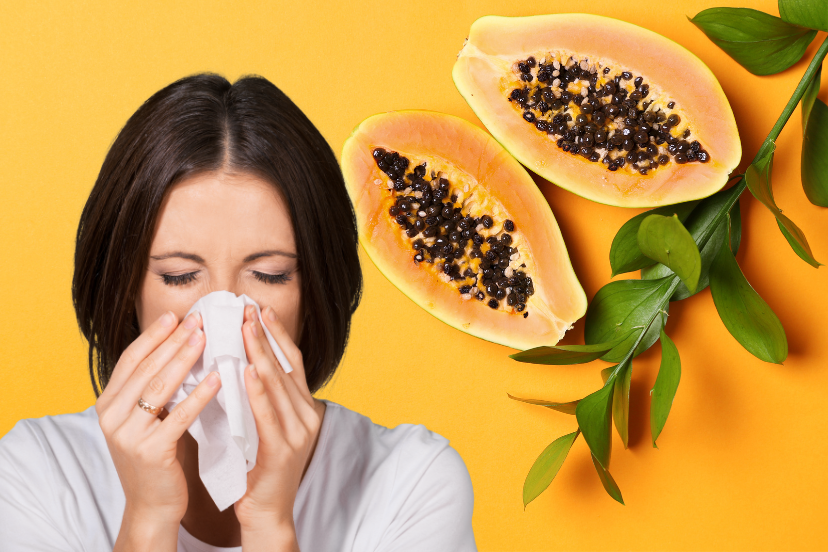Papaya Allergy: Unmasking the Hidden Danger
Introduction
Welcome, dear readers, to a crucial exploration of an often underestimated health concern: Papaya allergy. As exotic as the fruit itself may sound, it’s not all sunshine and tropical vibes when your body decides it’s had enough. We’re here to shed light on this lesser-known allergy, its symptoms, and what you can do to protect yourself. So, grab a seat, or a papaya if you’re feeling adventurous, and let’s dive into the world of papaya allergy.
Papaya Allergy
What Is Papaya Allergy?
The allergy is your body’s way of saying, “Hold on, that tropical fruit isn’t for me.” It’s an adverse reaction that your immune system has to specific proteins found in papaya. When you consume or come into contact with papaya, your immune system might go haywire, leading to a variety of symptoms.
Who Is at Risk?
Papaya allergy doesn’t discriminate – it can affect anyone. However, some individuals are more susceptible than others. This includes people with a history of allergies, particularly those who are allergic to other fruits or latex, as there’s a cross-reactivity between papaya and latex.
Common Triggers
Now, let’s dig into the nitty-gritty of what can set off a papaya allergy.
- Papain: The Culprit
Papain is an enzyme present in papaya that often triggers allergic reactions. It’s used as a meat tenderizer and in digestive enzyme supplements, which can catch many unsuspecting individuals off guard. - Cross-Reactivity with Latex
Cross-reactivity with latex is a common trigger. If you’re allergic to latex, consuming papaya can provoke an allergic response due to the shared allergenic proteins.
Symptoms of Papaya Allergy
Digestive Distress
- Upset Stomach: Nausea, vomiting, and abdominal pain may occur shortly after consuming papaya.
- Diarrhea: Loose stools can make an unwelcome appearance.
Skin Reactions
- Hives: Itchy, raised welts on the skin can develop.
- Itching: You might experience itching in various parts of your body.
- Swelling: Swelling of the lips, tongue, or face is a possible symptom.
Respiratory Troubles
- Sneezing: Allergic rhinitis can lead to sneezing.
- Coughing: A persistent cough may occur.
- Wheezing: Wheezing or shortness of breath can be frightening.
Anaphylaxis
In severe cases, a papaya allergy can trigger anaphylaxis, a life-threatening allergic reaction. Symptoms of anaphylaxis include:
- Difficulty breathing
- Swelling of the throat
- A drop in blood pressure
- Loss of consciousness
Diagnosis and Testing
Allergist Consultation
The first step is to consult an allergist who can evaluate your symptoms and medical history.
Skin Prick Test
A skin prick test involves placing a small amount of papaya extract on your skin and pricking it with a tiny needle. If you’re allergic, you’ll develop a small raised bump at the site.
Blood Tests
Blood tests can measure the levels of immunoglobulin E (IgE) antibodies specific to papaya.
Managing Papaya Allergy
Strict Avoidance
The most effective way to manage papaya allergy is to avoid papaya and any products containing papain or papaya extract. Read food labels carefully, and don’t hesitate to ask about ingredients when dining out.
Epinephrine Auto-Injector
If you’ve experienced anaphylaxis in the past, your allergist may prescribe an epinephrine auto-injector. This life-saving device can be a game-changer during emergencies.
Latex Allergy Awareness
If you have a latex allergy, it’s essential to be cautious with papaya, as cross-reactivity is a known risk.
Dietary Alternatives
Don’t despair; there are plenty of other fruits and vegetables to enjoy without the risk of an allergic reaction. Opt for delicious alternatives like mangoes, pineapples, or watermelon.
FAQs About Papaya Allergy
1. Can a Papaya Allergy Develop Suddenly?
Yes, allergies can develop at any time in life, even if you’ve consumed papaya without any issues before.
2. Are There Medications to Treat Papaya Allergy?
There’s no cure for food allergies, including this kind of allergy. The best approach is strict avoidance and having an epinephrine auto-injector on hand for emergencies.
3. Can I Outgrow a Papaya Allergy?
While some children outgrow allergies, it’s less common with papaya allergies. Consult your allergist for guidance.
4. Can Cooking Papaya Make It Safe for Allergic Individuals?
No, cooking papaya doesn’t deactivate the allergenic proteins. It’s essential to avoid it in all forms.
5. Is Cross-Reactivity with Latex Common?
Cross-reactivity with latex is relatively common in individuals with a latex allergy.
6. What Other Fruits Should I Be Cautious About If I’m Allergic to Papaya?
Individuals with papaya allergy may also need to be cautious with kiwi, avocado, and banana, as they share allergenic proteins with papaya.
Conclusion
In the world of allergies, papaya allergy might be a lesser-known adversary, but it’s not to be underestimated. Armed with the knowledge of its triggers, symptoms, and management strategies, you can take proactive steps to protect yourself and your loved ones. Remember, strict avoidance and preparedness are your allies in this battle against this kind of allergy. Stay informed, stay safe, and enjoy a life free from the unexpected hazards of this tropical delight.




